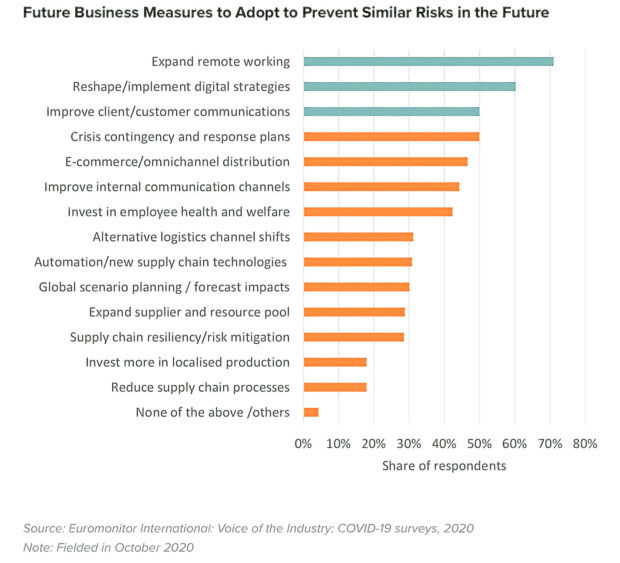
This was the main finding of market research firm Euromonitor International’s recently released report “Understanding Corporate Trends: Voice of the Industry 2021,” which contains results of their annual series of surveys conducted among professionals of 15 industries across the globe that’s focused on exploring corporate priorities. Typical sample sizes in each industry range from 250 to over 1,000, and these sectors include consumer electronics, consumer health, packaged food, luxury, travel and tourism, sustainability, alcoholic drinks, nonalcoholic Drinks, retailing, consumer food service, beauty and personal Care, home care, lifestyles, digital and tissue and hygiene.
“This year’s priorities are centered on two of the most important stakeholder groups for companies aiming to grow and thrive in the post-COVID era: customers and employees,” reads the report, which was authored by Lisa Holmes, Senior Global Head of Surveys.
In-store experience
On the customer aspect, the majority of businesses are reimagining their in-store experience, since more people are getting the vaccine and are expected to flock to shops—hence the importance of safety.
Across all regions, around 80 percent of businesses see the mandatory wearing of face masks as the most prevalent in-store safety measure (over 60 percent for the Asia-Pacific), followed by the use of hand sanitizers and the limiting of people allowed inside at any given time.
The boom of e-commerce has also shown consumers that safety should be coupled with convenience. In the Asia-Pacific, almost 60 percent of those surveyed cited home delivery as the top feature of any business. Contactless payments was cited as the second most important aspect (40 percent in the Asia-Pacific).For businesses seeking to bring back customers to their stores, technology plays an integral role on their relationship-building with customers.
Specifically, companies around the world are focusing on these tech-related investments that have been accelerated by COVID-19: tailored marketing or personalized recommendations (50 percent of the business); expansion of mobile apps and platforms (almost 50 percent); development or improvement of omnichannel presence and enhanced website or site navigation (both at over 40 percent of the business).
Finally, no business is going to thrive amid and after a pandemic without taking care of their employees, the report says.
Flexible working
COVID-19 forced employers to “rethink their attitudes to flexible working,” with remote work now the norm instead of a temporary fix. Comparing results of Voice of the Industry surveys held last year, the number of professionals expecting a permanent shift to some form of working from home rose by 20 percent from April to October 2020.What this means, says the Euromonitor report, is that a shift to a “blended” approach is more likely, with the setup varying across companies, even if they belong to the same industry. Some sectors, however, because of their nature, simply cannot adopt a remote or hybrid work setup and need to perform their jobs onsite (i.e. restaurants, hospitals, retailers, construction sites).
Still, businesses have now become more wary of future risks because of the pandemic, and continue to focus on remote work, digital adoption and communication.
“By understanding what cross-industry peers are focusing on for future investments and long-term strategies, businesses can stay ahead of change, embrace new opportunities to improve the customer experience (whether in-store or online) and position employees for success in a changing work environment,” the report says. INQ

